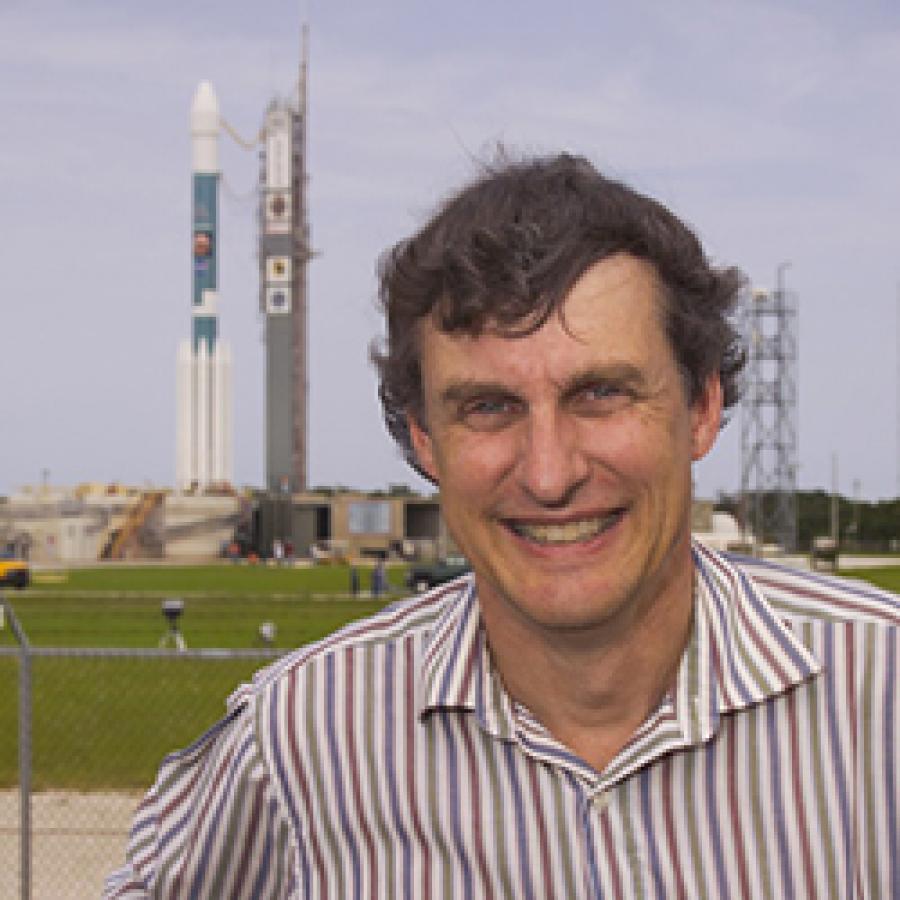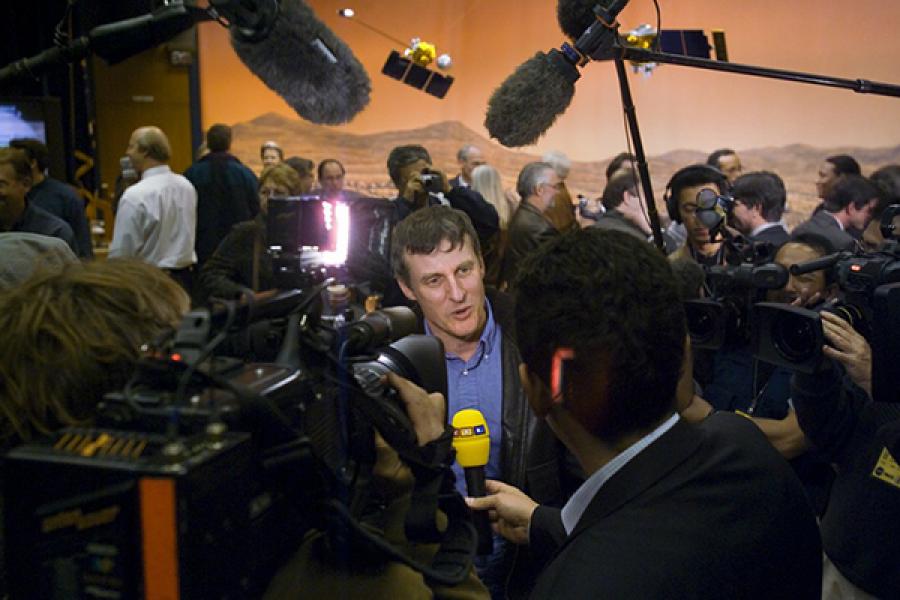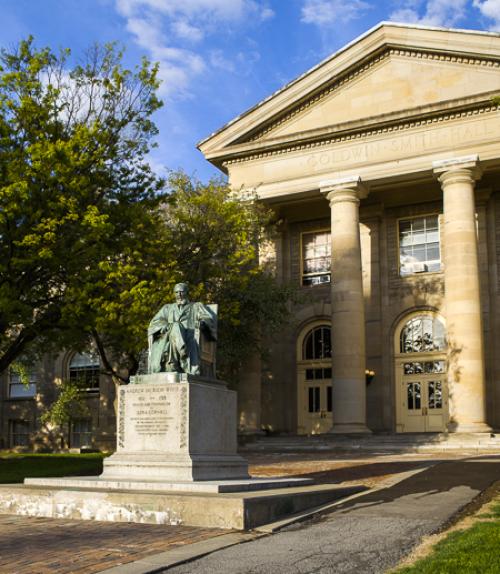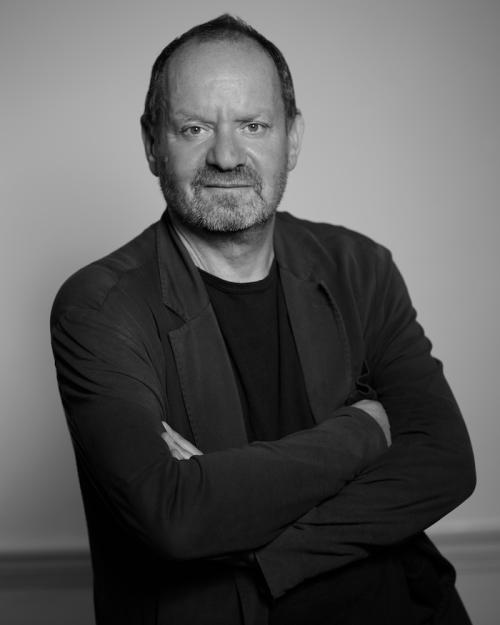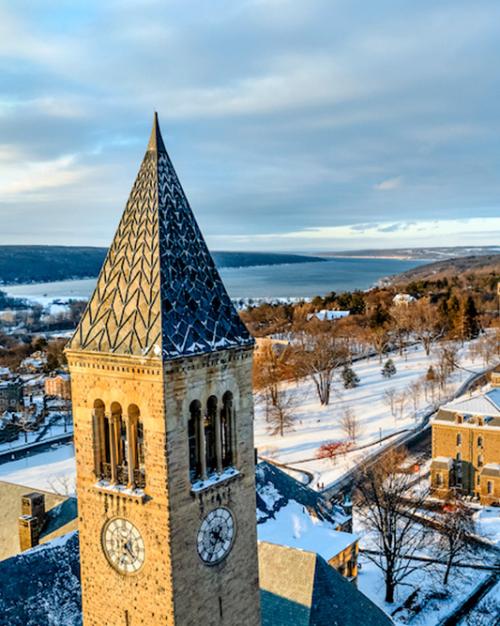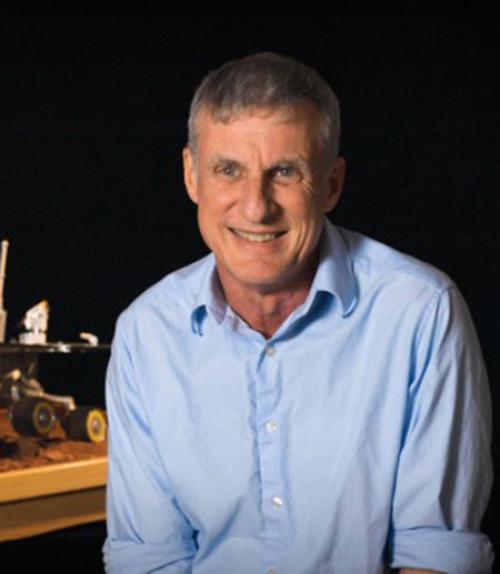Steve Squyres ’78, Ph.D. ’81, the James A. Weeks Professor of Physical Sciences, who has taught astronomy, conducted research and chaperoned two Mars rovers on their 300 million-mile journey to Earth’s rust-colored neighbor, will retire from Cornell Sept. 22.
His next endeavor will be as the chief scientist for the private aerospace company Blue Origin.
“Cornell has been a wonderful place for me, as both a student and a professor. With the Mars rover missions behind us, it’s time for me to find a new challenge, but I will always be a proud Cornellian,” Squyres said.
“Scientist, scholar and space explorer, Steve transformed planetary exploration through his leadership of the Spirit and Opportunity Mars rovers,” said Jonathan I. Lunine, the David C. Duncan Professor in the Physical Sciences and chair of the Department of Astronomy. “Now he goes on to a new challenge, working to transform the architecture of spaceflight at one of the most innovative companies in the industry.”
When Squyres was a boy, he would peer through his reflecting telescope and record the nightly waltz of Jupiter’s moons. As a Cornell undergraduate, he majored in geology since he enjoyed climbing mountains, but he combined his passion for the heavens and geology while working as a graduate student on NASA’s Voyager mission to Jupiter.
This culminated in his 1981 doctoral thesis, “The Morphology and Evolution of Ganymede and Callisto,” studying under Joseph Veverka, Cornell professor of astronomy.
Steve Squyres stands near the Cape Canaveral launchpad, which was being prepared to send the Mars rover Opportunity into space.Squyres worked at NASA’s Ames Research Center in Mountain View, California, as a postdoctoral researcher and NASA scientist, but Cornell coaxed him into a faculty position in 1986, where he has taught, inspired students and other faculty members, and helped send spaceships to Mars to explore the planet’s watery past.
Lisa Kaltenegger, associate professor in astronomy and director of Cornell’s Carl Sagan Institute, shares Squyres’ enthusiasm for investigating the heavens. “Steve’s passion for exploration is contagious,” she said.
In October of 2017, on the 40th anniversary of the launch of the Voyager 1 and Voyager 2 missions, Squyres participated in a panel organized by the Carl Sagan Institute.
“Steve's vivid description of the early days to the future of exploration of our solar system captured everyone in the audience and let everyone take part in this adventure,” she said. “It inspires me and our search for life in our solar system and beyond at Cornell’s Carl Sagan Institute. I will miss seeing Steve here at the department on a daily basis, but I think getting to space just got a lot easier because Steve decided to help make it happen in the near future.”
Among the items on his long curriculum vita, Squyres chaired the National Research Council Planetary Decadal Survey in 2009, and the NASA Advisory Council from 2011-16.
As a teacher, Squyres brought the abstraction of fresh science into his classroom, and shared rover news from Mars with his students.
“This mission [Spirit and Opportunity] was a great teaching tool,” Squyres said earlier this year for the celebration of the mission’s 15th anniversary. “It’s easy to think of science as a static body of knowledge that you learn from a textbook. It is not. We know more about Mars today than we knew two days ago. For years I’ve started each lecture with, ‘Here’s something that just came down from Mars.’”
“Steve has inspired countless students and colleagues over his decades at Cornell,” said Ray Jayawardhana, the Harold Tanner Dean of Arts and Sciences and professor of astronomy. “He brought Mars to campus and gave us all a chance to see another world close-up. His infectious enthusiasm for exploration will continue to stimulate planetary scientists at Cornell for years to come. We wish him all the best.”
Media swarm Steve Squyres upon the successful landing of the rover Spirit on Mars in early January 2004.While Squyres oversaw the rovers’ scientific mission, undergraduate and graduate students soon became key team members.
Two undergraduates who worked on the mission are now members of the Cornell faculty: Dmitry Savransky ’04, M.Eng. ’05, assistant professor of mechanical and aerospace engineering; and Alex Hayes ’03, M.Eng. ’03, associate professor of astronomy.
“When I was a high school student, I emailed Steve asking about working on a mission to Mars if I were to come to Cornell as an undergraduate,” recalled Hayes, who was invited to join Squyres’ research group immediately after admission.
“Steve Squyres is the reason I came to Cornell as an undergraduate,” Hayes said. “Thirteen years later, learning from and working with him was one of the main reasons I wanted to come back as a professor. Hands down, Steve is the most effective and inspiring leader I have ever met.
“You can’t help but feel excited and motivated when working with him,” he said. “At my undergraduate graduation, I remember trying to thank him for all the opportunities he had provided me. His response to my thanks was a simple request to pay it forward. I have and continue to take that advice to heart.”
Inevitably, for Squyres, there will be more journeys to the stars.
“Steve Squyres is a unique figure in the history of Mars exploration,” Lunine said. “He developed an entire science payload for exploring the surface of Mars and convinced NASA to fly it there on two rovers – with enormous success. I will deeply miss his role in Cornell astronomy, but I look forward to the remarkable things he will help bring about in commercial human spaceflight at Blue Origin.”
This story first appeared in the Cornell Chronicle.
